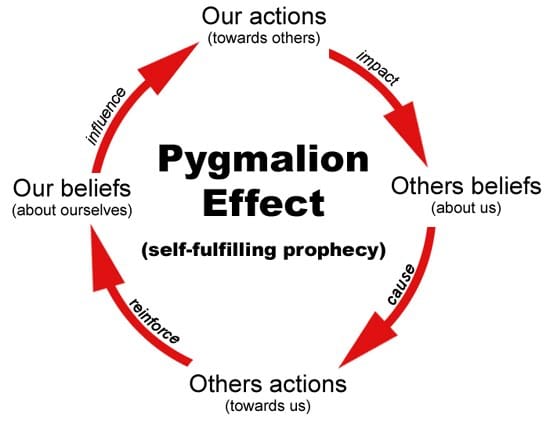Have you ever heard the saying, “You get what you expect?” While it might sound like a simplistic notion, it’s deeply rooted in a psychological phenomenon known as the Rosenthal effect. This fascinating concept highlights how our beliefs about others, even if they’re entirely unfounded, can significantly influence their performance and behavior. It’s a powerful reminder that the power of perception extends far beyond our own minds, shaping the very reality around us.

Image: www.edupstairs.org
The Rosenthal effect, also known as the Pygmalion effect, was first observed in a groundbreaking study conducted by Robert Rosenthal and Lenore Jacobson in 1968. They found that elementary school teachers’ expectations about their students’ academic abilities, even when those expectations were randomly assigned, had a profound impact on the students’ actual performance. This suggests that our expectations are not simply passive observers of reality; they actively mold and shape it.
The Origins of the Rosenthal Effect
The Pygmalion Myth
The term “Pygmalion effect” originates from the Greek myth of Pygmalion, a sculptor who fell in love with a statue he had created. His love and admiration were so profound that the gods intervened, bringing the statue to life. This myth illustrates the power of belief and expectation to transform the inanimate into the animate.
The Rosenthal and Jacobson Study
The seminal study that solidified the Rosenthal effect was conducted by Rosenthal and Jacobson in 1968. They administered an IQ test to elementary school students and randomly assigned them to “bloomers” or “non-bloomers,” even though the test results were not actually used to determine these classifications. They then informed teachers that the “bloomers” were expected to exhibit significant academic growth. The results were astonishing: the students labeled as “bloomers,” regardless of their initial IQ scores, showed a marked increase in their academic performance over the course of the year. This demonstrated that the teachers’ expectations, instilled by the researchers, had a tangible impact on the students’ intellectual development.

Image: www.youtube.com
The Mechanism Behind the Rosenthal Effect
The Rosenthal effect operates through a complex interplay of social and cognitive factors. Here are some key contributors:
- Teacher Behavior: Teachers tend to behave differently towards students they expect to perform well. They may provide more attention, encouragement, and opportunities for learning, creating a more nurturing and stimulating environment.
- Student Self-Perceptions: Students who are expected to succeed may internalize these expectations and develop a more positive self-image. This heightened sense of confidence can translate into increased motivation and effort, leading to better academic outcomes.
- Non-verbal Communication: Subtle cues like facial expressions, body language, and tone of voice can communicate teachers’ expectations and influence students’ perception of their own abilities.
- Feedback and Evaluation: Teachers may subconsciously provide more constructive feedback and positive reinforcement to students they expect to excel, further solidifying their belief in their capabilities.
Real-World Applications of the Rosenthal Effect
The Rosenthal effect has profound implications in various aspects of life, including:
Education
Teachers’ expectations play a critical role in shaping students’ academic success. By being conscious of the Rosenthal effect, educators can strive to create inclusive and supportive learning environments where every student feels valued and empowered. This includes:
- Setting high expectations for all students: Avoid labeling students based on preconceived notions or past performance.
- Providing positive reinforcement and constructive feedback: Encourage and motivate students through individualized guidance and appreciation.
- Fostering a growth mindset: Emphasize the importance of effort, perseverance, and continuous learning.
Workplace
Managers and supervisors, aware of the Rosenthal effect, can cultivate a positive and motivating work environment by communicating high expectations and providing support and recognition for employees’ contributions. This can lead to increased productivity, job satisfaction, and reduced absenteeism.
Health and Wellness
The Rosenthal effect has even been observed in the realm of health and wellness. Patients’ beliefs about their prognosis and treatment effectiveness can significantly influence their outcomes. Doctors and healthcare professionals can leverage this knowledge to empower patients and enhance their well-being.
Other Real-World Examples
The Rosenthal effect has been demonstrated across a variety of settings, including:
- Sports: Coaches’ expectations can impact athletes’ performance and their belief in their own abilities.
- Customer service: Service representatives’ expectations about customers’ satisfaction levels can influence their interactions and ultimately determine customer satisfaction.
- Social interactions: Our initial perceptions of others can shape how we behave towards them, influencing their responses and potentially confirming our initial expectations.
The Power of Perception
The Rosenthal effect underscores the profound power of perception in shaping reality. It highlights the immense responsibility we have to be mindful of our own expectations and their potential impact on those around us. We must strive to create and nurture environments that foster positive self-belief and encourage growth and development. The power of expectation is potent, and by harnessing it consciously, we can unlock the potential of individuals and shape a better future for all.
The Rosenthal Effect
Conclusion
The Rosenthal effect serves as a compelling reminder of the impact our beliefs and expectations can have on others. It is a phenomenon that operates both consciously and unconsciously, influencing behavior, performance, and ultimately, the course of individuals’ lives. By understanding the Rosenthal effect, we can become more aware of our own biases and strive to create supportive and empowering environments where everyone has the opportunity to thrive. It encourages us to embrace the power of positive expectations and to recognize the profound influence they have on shaping the world around us.





